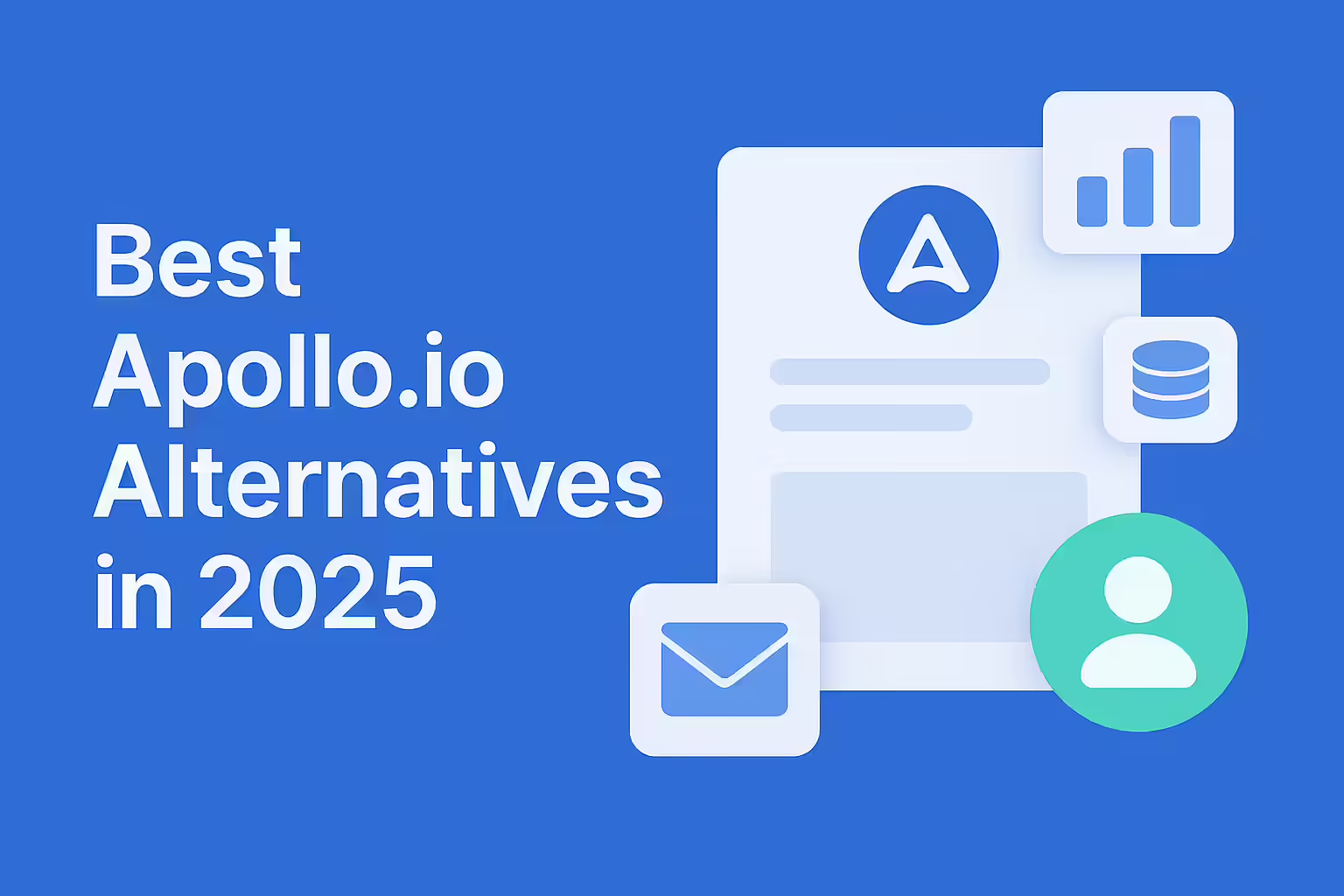In the modern sales technology landscape, few tools have achieved the ubiquity of Apollo.io. It has established itself as a comprehensive, all-in-one sales intelligence and engagement platform, widely adopted by revenue teams across the globe. At its core, Apollo offers a powerful proposition: a massive B2B database, reportedly containing over 275 million contacts and 60 million companies, combined with the tools to engage those contacts directly within the same interface. This consolidation of prospecting and engagement is the cornerstone of its appeal, particularly for small-to-medium-sized businesses (SMBs) and startups seeking to build their go-to-market motion without the complexity and cost of a fragmented tech stack.
The platform’s core value lies in its ability to streamline the top of the sales funnel. Sales development representatives (SDRs) and marketers can leverage its detailed search filters—spanning industry, company size, technology stack, and job roles—to identify and segment potential leads. Once a target list is built, users can deploy the platform’s email sequencing and automation tools to initiate outreach campaigns, all while tracking basic engagement metrics. This unified workflow, accessible through a web app and a popular LinkedIn extension (though recently impacted), has earned Apollo a formidable reputation.
The market success of Apollo.io, however, is not merely a function of its feature list. It is a masterclass in product packaging, offering a suite of “good enough” functionalities at a price point that is exceptionally attractive to nascent and growing companies. It addresses the two most fundamental questions every new sales team faces: “Who do we contact?” and “How do we contact them?”
Yet, this very model—the all-in-one convenience that makes Apollo so compelling at the outset—harbors a hidden trap. The platform’s architecture and commercial model are optimized for the initial stages of prospecting, but they begin to show critical weaknesses as a business scales. As a team’s need for high-fidelity, high-volume, and truly multi-channel communication grows, particularly through voice, the limitations of the platform become a significant drag on revenue growth. The tool that helped a company get off the ground can quickly become the ceiling that limits its potential.
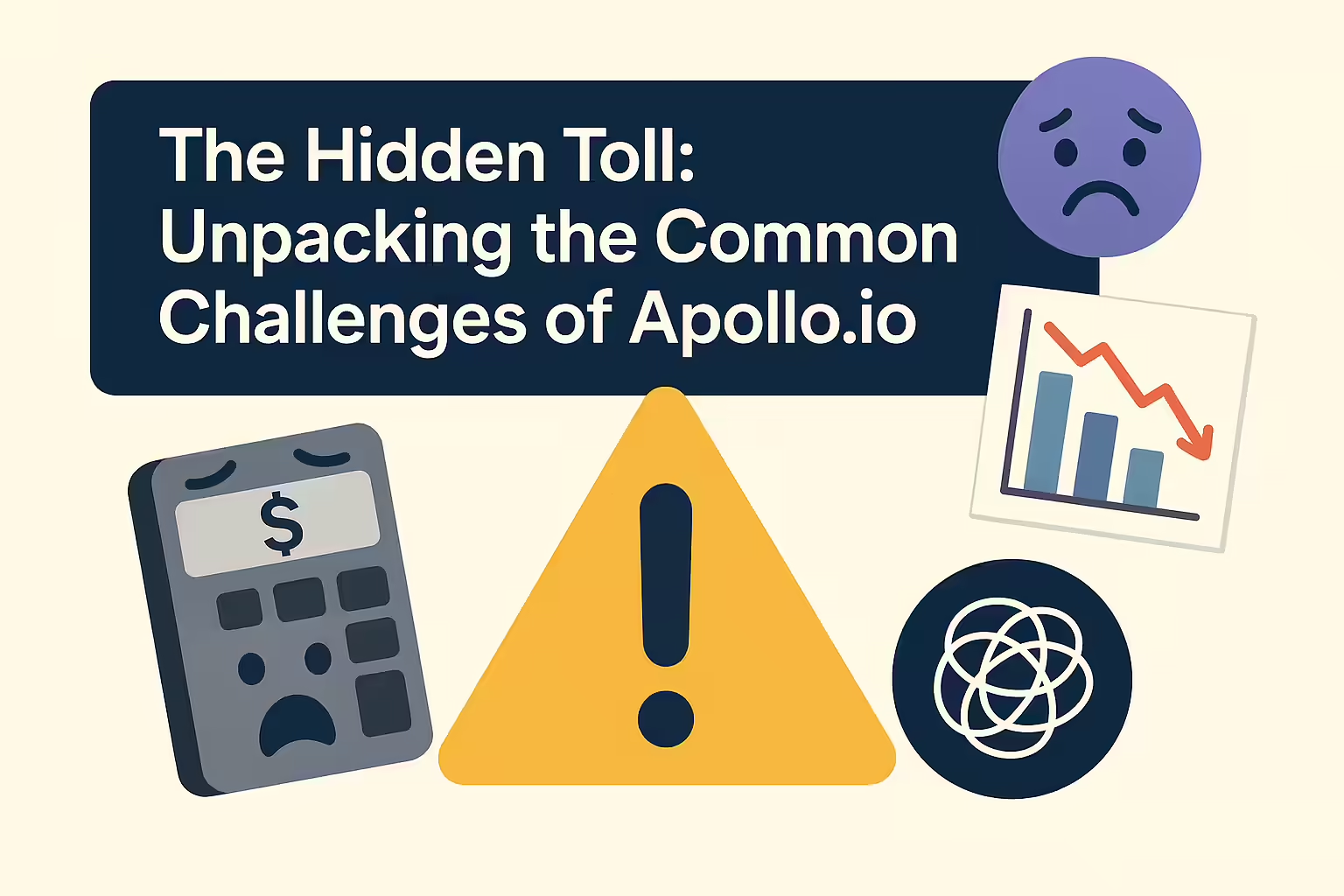
The Hidden Toll: Unpacking the Common Challenges of Apollo.io
While Apollo.io presents a compelling entry point into sales automation, a deeper analysis reveals significant operational friction and hidden costs that can impede a scaling sales team. These challenges are not minor inconveniences; they represent fundamental misalignments between the platform’s design and the core objectives of a high-performance revenue organization.
- The Confusing Credit Economy and The Myth of “Unlimited”: One of the most significant points of friction is Apollo’s complex and often punitive credit-based system. While “unlimited” email credits are marketed, these are subject to fair use policies and annual caps. The real constraints appear with mobile phone numbers and data exports, governed by strict, tiered allowances that deplete rapidly. Mobile numbers were even removed from free and basic packages in late 2023. The cost of purchasing additional credits can be substantial—often cited around $0.20 each—causing monthly costs to skyrocket unexpectedly. This model creates a “scarcity mindset,” forcing teams to ration outreach.
- The Data Accuracy Gamble: For a platform whose primary value is its database, data integrity is paramount. While vast, numerous user reviews and independent analyses point to persistent issues with data accuracy, particularly with phone numbers that are frequently outdated or incorrect (some sources indicate phone accuracy around 40%). This is a critical failure. Every wrong number dialed is not just a lost opportunity; it’s a quantifiable waste of a sales representative’s most valuable asset: time.
- Engagement as an Afterthought: The Underpowered Dialer: The disconnect between Apollo’s data-centric model and the needs of an active sales team is most apparent in its dialer functionality. Apollo relegates its dialer to its more expensive Professional and Organization plans, completely excluding it from the Basic tier. Even for those who pay for access, the tool is frequently described as “basic” and buggy, lacking the advanced features required for efficient, high-volume calling. This treatment of voice communication as a premium, non-essential feature demonstrates a fundamental misunderstanding of the modern sales process.
- Poor Email Deliverability: Users report issues with email deliverability, high bounce rates, and spam risks, partly due to outdated contact information and the platform’s lack of an email warm-up feature.
- Limited Personalization and Scalability: While Apollo offers some personalization, it may not be advanced enough for truly tailored emails at scale, often requiring additional manual effort. It also limits the number of users, impacting scalability for growing teams.
- User Interface/Experience (UI/UX): Some users find Apollo’s UI/UX confusing and not easy to navigate, leading to a steeper learning curve.
- Support in Absentia: A recurring theme in critical reviews is the absence of real-time support channels like live chat or phone support. Sales teams encountering critical issues are often forced to submit an email ticket and wait for slow response times, sometimes days or even weeks—a delay simply untenable for a fast-paced sales environment.
- Compliance Concerns: Despite claiming GDPR compliance, some sources raise concerns due to Apollo.io collecting user data, including personal emails, which can complicate GDPR adherence and has been linked to data breaches.
- Recent LinkedIn Restrictions (2025): In early 2025, LinkedIn restricted Apollo.io’s platform access and removed its company page due to unauthorized data scraping. This renders key LinkedIn features, like one-click lead scraping through Apollo’s extension, non-functional.
Given these concerns, many teams are exploring alternatives that offer more reliable data, better integrations, a simpler experience, or greater cost-effectiveness. The “best” alternative, however, is not a single product but depends entirely on which of Apollo’s core functions—data acquisition or prospect engagement—a team is looking to improve.
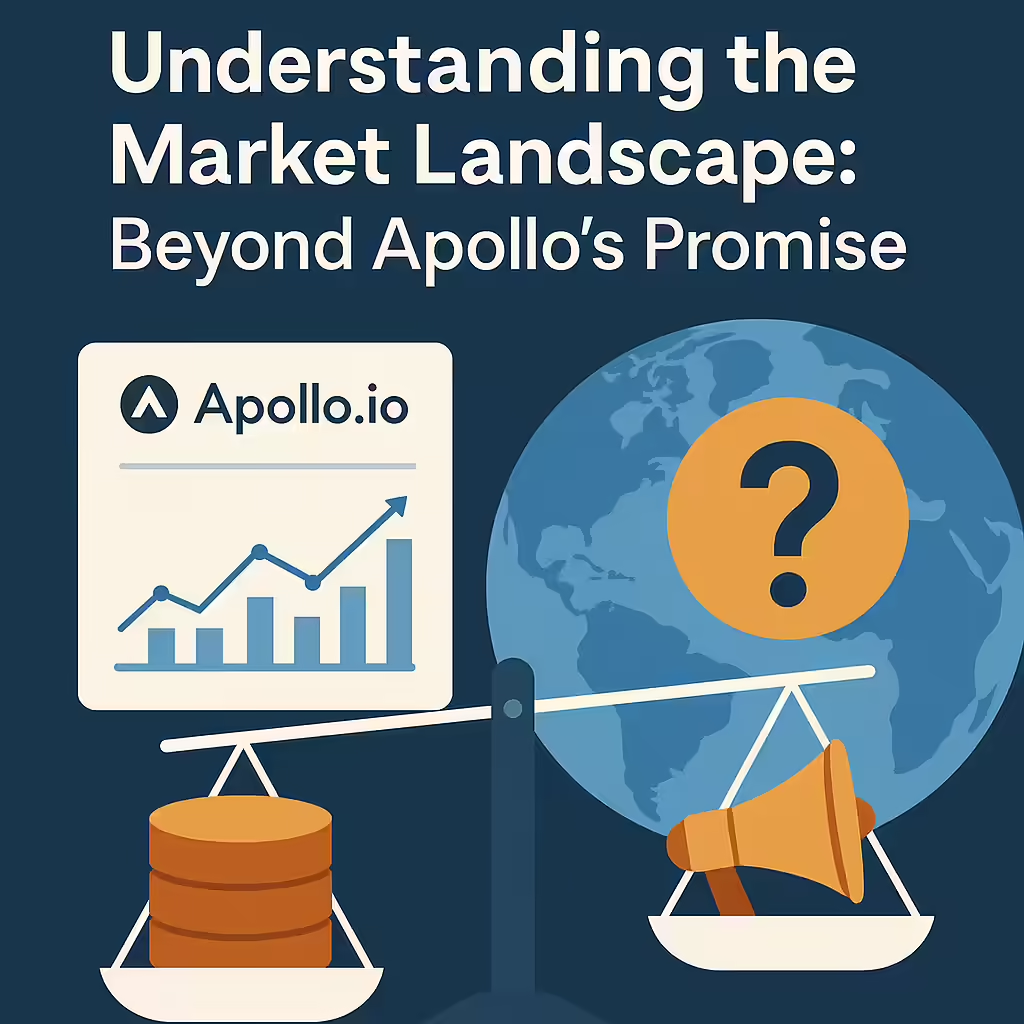
Understanding the Market Landscape: Beyond Apollo’s Promise
To understand where to turn when Apollo’s limitations become a bottleneck, it is essential to map the broader sales technology landscape. The market has largely bifurcated, forcing buyers into a difficult choice between powerful but incomplete solutions.
- The Enterprise Data Leviathans (e.g., ZoomInfo): At the highest end are the enterprise-grade data powerhouses, with ZoomInfo as the undisputed leader. Positioned as a comprehensive business intelligence platform, ZoomInfo offers a massive database often lauded for its depth and accuracy, particularly for US contacts, including over 135M+ verified mobile phone numbers. It provides advanced features like buyer intent data and real-time data enrichment for sophisticated, large-scale go-to-market strategies. The catch, however, is its prohibitive custom pricing, often starting at $15,000 per year, placing it well outside the reach of SMBs.
- The Dedicated Engagement Platforms (e.g., Salesloft, Outreach): On the other side are the dedicated Sales Engagement Platforms (SEPs). These platforms are best-in-class for orchestrating complex, multi-channel sales sequences. They offer far more sophisticated workflow automation, A/B testing, and AI-driven sales coaching features. The critical weakness of this category, however, is that these platforms do not have a native prospecting database. A team using Salesloft or Outreach must license a separate, expensive data provider to source their leads, creating a highly powerful but fragmented and extremely costly tech stack.
- The Niche Prospecting Tools (e.g., Lusha, RocketReach, Hunter.io): Occupying a specific space as direct competitors to Apollo’s data-sourcing function are a variety of niche prospecting tools. Platforms like Lusha have built a strong reputation for providing accurate mobile phone numbers (60M+ contacts). RocketReach commands attention with its massive database of 700 million professional profiles, while Hunter.io excels specifically at email discovery (102M+ professional emails with 95% accuracy). These tools can serve as cost-effective point solutions for teams looking to supplement their existing systems with a specific type of data. However, their specialized nature is also their primary limitation: they are not engagement platforms and provide no native capability to efficiently dial those numbers, log outcomes, or automate follow-up.
This market structure reveals a clear divide. Sales teams are typically forced to choose between “Data-First” platforms, which know who to call but are mediocre at the calling itself, and “Engagement-First” platforms, which are excellent at the process of outreach but contain no data. Apollo attempts to bridge this gap but, as established, makes significant compromises on the engagement side, especially for voice. This creates a strategic void in the market for a solution that is both data-agnostic and a world-class communication engine.
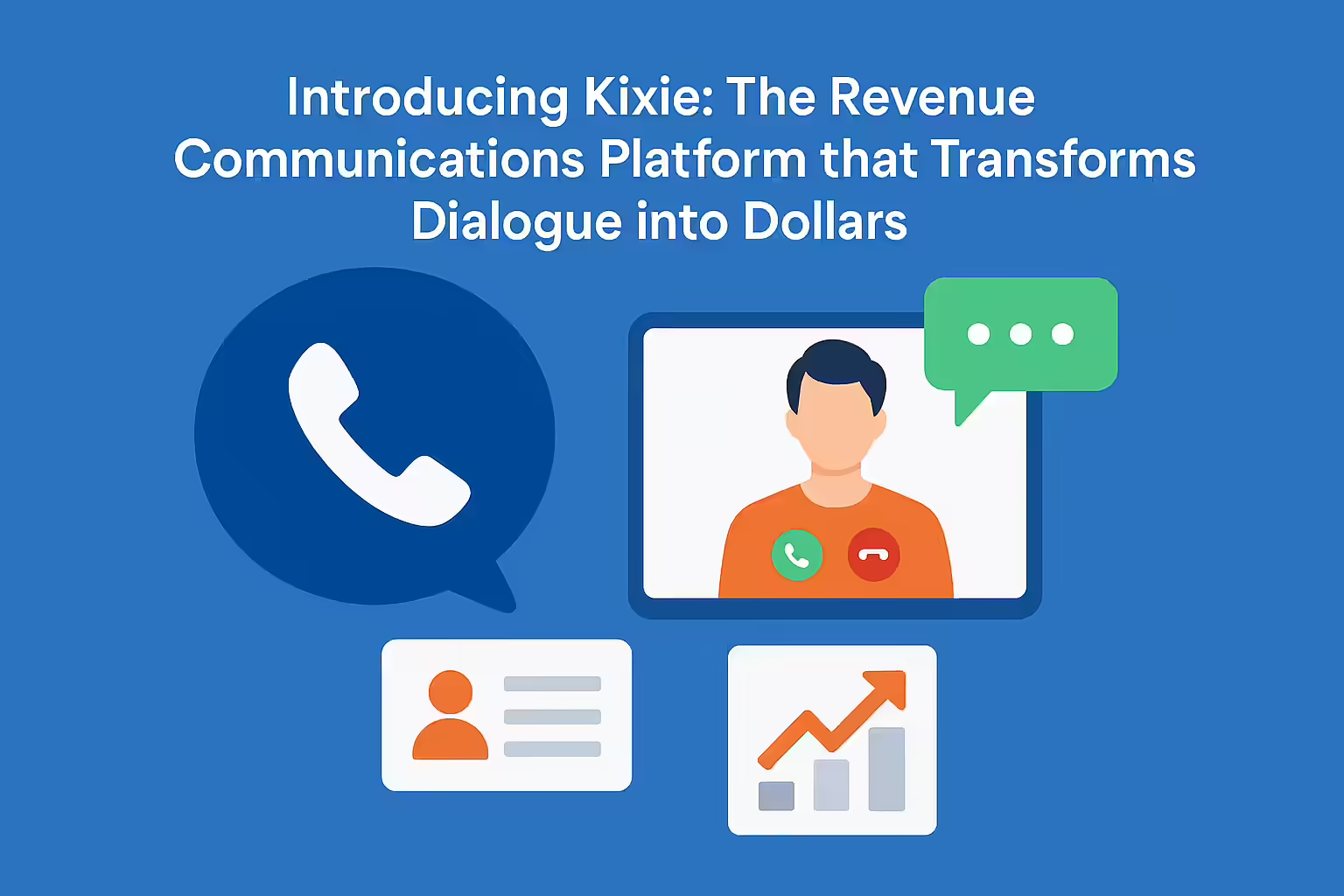
Introducing Kixie: The Revenue Communications Platform that Transforms Dialogue into Dollars
The limitations of data-centric platforms and the high cost of fragmented enterprise solutions highlight a critical truth: the goal of sales is not to amass contacts in a database; it is to have revenue-generating conversations. This paradigm shift, from prospecting to connecting, is where Kixie emerges as the definitive alternative for sales teams focused on tangible outcomes. Kixie is not just another dialer; it is a comprehensive revenue communications platform engineered to solve the specific failures of tools like Apollo and activate a sales team’s full potential.
Kixie’s design philosophy directly addresses the core weaknesses that hamstring scaling teams on Apollo. It provides a specialized, high-horsepower engine for the most crucial part of the sales process: live interaction.
- Apollo’s Underpowered Dialer vs. Kixie’s AI-Powered Multi-Line Power Dialer: Where Apollo offers a basic, single-line click-to-call function as a premium add-on, Kixie provides a state-of-the-art, AI-powered multi-line Power Dialer as a core component of its platform. This technology allows a single representative to dial up to 10 lines simultaneously. Kixie’s advanced AI Human Voice Detection instantly identifies and bypasses voicemails and IVR systems, connecting the agent only when a live human answers. The impact on productivity is staggering, dramatically increasing the number of live conversations an agent can have each day.
- Apollo’s Poor Connection Rates vs. Kixie’s ConnectionBoost™: Sourcing a phone number from a database is only half the battle; getting the prospect to answer is the other. Kixie directly tackles the pervasive problems of low answer rates and carrier-side spam flagging with its proprietary ConnectionBoost™ technology. This feature utilizes AI-powered local presence dialing, which automatically displays a local area code to the prospect, a tactic proven to increase connection rates by up to 400%. Crucially, ConnectionBoost™ intelligently and progressively rotates these caller ID numbers to prevent them from being flagged as “Spam Likely” by carriers, ensuring calls actually reach their intended recipients. This is a sophisticated, high-value capability that data-first platforms like Apollo simply do not offer.
- Apollo’s Fragmented Workflow vs. Kixie’s Flawless Bidirectional CRM Integration: While Apollo offers integrations, users frequently report issues with data syncing, creating an unreliable and fragmented workflow. Kixie, in contrast, is built around deep, seamless, and fully bidirectional CRM integration. It connects flawlessly with major platforms like HubSpot, Salesforce, Zoho, and Pipedrive, automatically logging every call, text message, outcome, and call recording in real-time without any manual data entry from the rep. This creates a perfect, single source of truth within the team’s existing CRM, eliminating administrative busywork and providing managers with a crystal-clear view of team activity and performance.
- Apollo’s Absent Support vs. Kixie’s Celebrated US-Based Team: In stark contrast to the widespread complaints about Apollo’s customer service, Kixie is consistently lauded for its outstanding support. A wealth of G2 reviews highlights the responsiveness, expertise, and helpfulness of Kixie’s US-based support team, which is readily available to resolve issues quickly and ensure customers achieve their desired outcomes. This level of partnership and reliability provides the peace of mind that is essential for teams whose revenue depends on their communication tools.
This analysis leads to a sophisticated conclusion: Kixie is not merely a replacement for Apollo but can also serve as its perfect complement. A sales team can continue to leverage Apollo, or any other platform, for its strength in data sourcing. They can build their lists and identify their targets. Then, they can plug Kixie in as the high-performance “action layer” to activate that data. Kixie takes a static list of phone numbers and transforms it into a torrent of live conversations, solving the critical last-mile problem of sales engagement. This positions Kixie as an indispensable component of any modern sales stack, capable of supercharging the ROI of a team’s existing data investments. By focusing on the conversion of data into dialogue, Kixie fundamentally redefines the metrics of success from “activities completed” to “pipeline generated.”
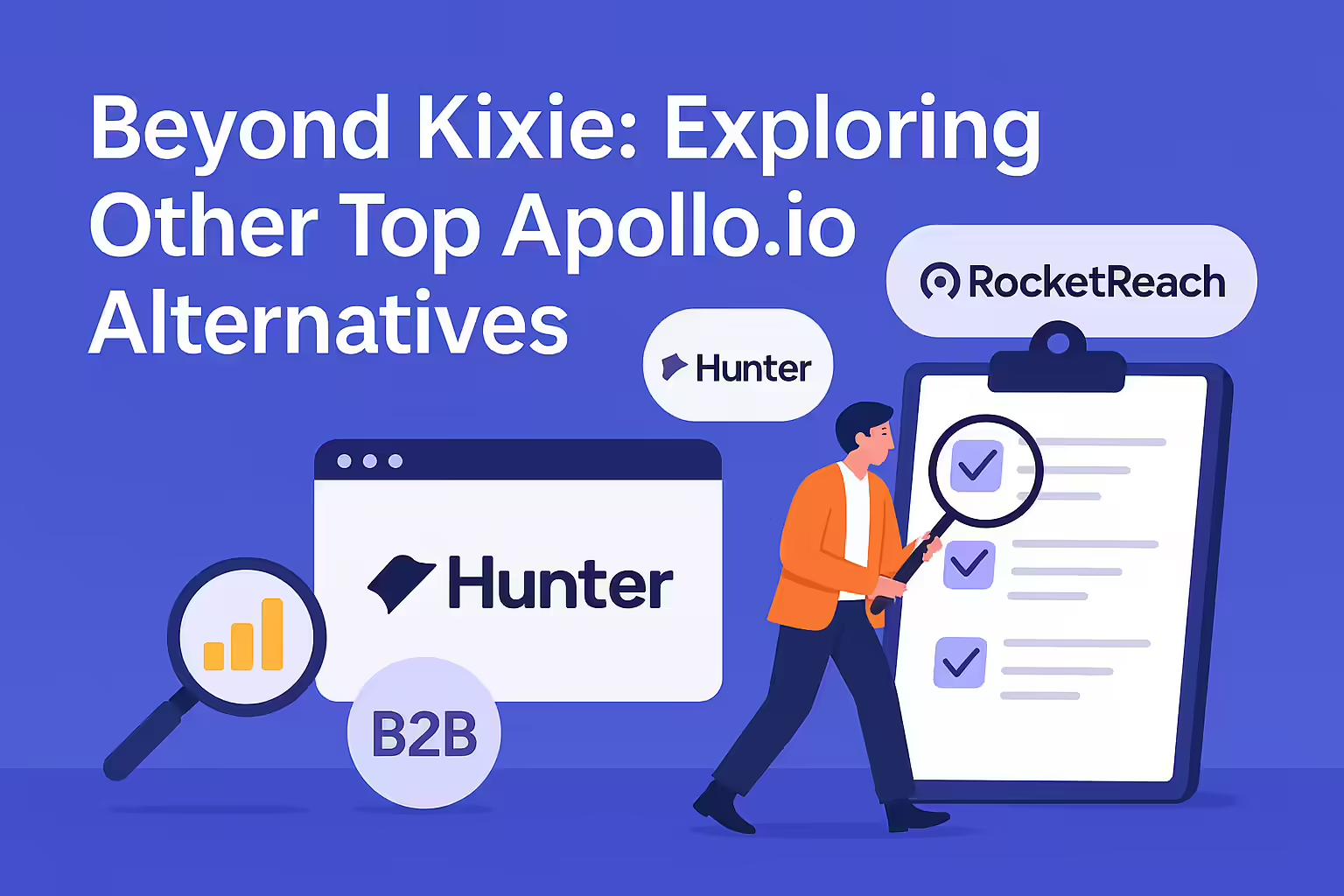
Beyond Kixie: Exploring Other Top Apollo.io Alternatives
While Kixie stands out for maximizing live conversations, other strong Apollo.io alternatives cater to specific needs for sales intelligence and outreach.
1. Saleshandy – Accurate, Scalable, and Cost-Effective Outreach
- Saleshandy is a comprehensive B2B prospecting and AI-assisted cold outreach platform boasting over 700 million B2B contacts. It stands out for its in-built email warm-up, sender rotation, and the ability to connect unlimited email accounts, add unlimited clients (for agencies), and invite unlimited team members at no additional cost—a significant advantage over Apollo.io.
- Best For: Businesses and lead generation agencies seeking a scalable and cost-effective solution for robust email prospecting and outreach.
2. Cognism – Superior Mobile Data and Compliance
- Cognism is a powerhouse for B2B prospecting, especially for its superior mobile data capabilities (47 million mobile numbers in the US, with an 87% connection success rate) and strong compliance (GDPR and CCPA compliant with DNC list checking).
- Best For: Businesses and agencies prioritizing highly accurate, phone-validated mobile numbers and strong data compliance, especially for global outreach.
3. ZoomInfo – Best Enterprise-Grade Data
- ZoomInfo is primarily focused on enterprise-level solutions with over 260 million individual profiles and 100 million company profiles. It excels in buyer intent data, website visitor identification, and real-time data enrichment.
- Best For: Enterprises with large budgets seeking comprehensive sales and marketing intelligence. (While strong in data, its dialing features are basic, making Kixie a better companion for execution.)
4. Lusha – Budget-Friendly and Intuitive Data
- Lusha is recognized as a cost-effective Apollo alternative, powered by a crowdsourced database of over 60 million+ professional contacts. It provides strong mobile number accuracy compared to Apollo, GDPR/CCPA compliance, and an intuitive UI, especially for LinkedIn prospecting.
- Best For: Startups and SMBs seeking reliable contact data at a budget-friendly price, especially for LinkedIn prospecting. (Pairs well with Kixie for outreach execution).
5. RocketReach – Largest Database Alternative
- RocketReach commands attention with its massive database of 700 million professional profiles. It offers AI-powered recommendations and extensive search filters for finding contacts with an 85% success rate for A or A- grade email addresses/phone numbers.
- Best For: Medium-sized businesses and teams requiring extensive, accurate contact data where database size is a top priority. (Another great source for lists that Kixie can then activate.)
6. Hunter.io – Best for Email Discovery
- Hunter.io excels as a specialized prospecting tool primarily focused on email discovery, with a database of over 102 million professional email addresses and an impressive 95% accuracy rate. It features a domain search, confidence scoring, and basic campaign functionality.
- Best For: Small and medium-sized businesses, freelancers, and startups primarily focused on reliable email outreach and targeted email discovery.
7. Snov.io – Most User-Friendly Option
- Snov.io stands out for its intuitive interface and comprehensive feature set, processing over 500 million leads annually. It combines an email finder with drip campaigns, AI conversation generation, and a built-in CRM.
- Best For: Businesses and agencies looking for a user-friendly, beginner-friendly platform for quick prospecting and multichannel outreach.
8. Lead411 – Best for Intent Data
- Lead411 excels in providing actionable intent data through its partnership with Bombora, offering unique insights into buyer behavior. It features a “Triple Verified Email System” and “Growth Triggers” to track key company events.
- Best For: Businesses and account-based marketers prioritizing intent data and in-depth lead intelligence to target prospects based on buying signals.
9. ContactOut – Best for Recruitment
- ContactOut specializes in talent acquisition, empowering recruiters with access to a database containing 300 million professionals. It boasts triple verification of contact details and provides personal emails and direct dials.
- Best For: Recruitment professionals, sales, and marketing teams seeking reliable contact data for talent acquisition and direct phone connections.
10. Salesforge – Superior Email Deliverability and Infrastructure
- Salesforge.ai is designed to revolutionize cold email outreach, focusing on better email deliverability and infrastructure. It offers programmatic personalization at scale, seamless email setup, and unlimited mailboxes/users.
- Best For: Businesses, sales teams, and agencies prioritizing high deliverability, advanced personalization, and robust email infrastructure for cold email outreach.
11. Instantly.ai – Best for Email Deliverability at Scale
- Instantly.ai is a robust platform focused on improving cold email deliverability and streamlining processes, especially for those running campaigns across multiple domains or needing to send thousands of personalized emails at scale, offering unlimited email warmup and a B2B contact database.
- Best For: Cold email pros, agencies, or teams managing outreach across different brands/clients who prioritize email deliverability and scaling outreach.
12. Smartlead.ai – Easy Interface and Deliverability
- Smartlead.ai is an advanced cold email outreach platform that automates and optimizes the entire process of contacting potential customers, emphasizing a smooth user experience and superior email deliverability. It includes AI-powered email warm-up and multi-channel integrations.
- Best For: Marketers and businesses looking for an intuitive platform that prioritizes deliverability and offers advanced personalization for cold email outreach.
13. Lemlist – Best for Multi-Channel Prospecting
- Lemlist focuses on creating lead lists with verified contacts, automating email drip campaigns, and personalizing emails, with its true strength in multi-channel outreach capabilities (LinkedIn, email, cold calling) and its Lemwarm email warm-up tool.
- Best For: Businesses looking to expand into multi-channel outreach and prioritize high email deliverability and advanced personalization.
14. Seamless.ai – Real-Time Search and AI Capabilities
- Seamless.ai sets itself apart with its real-time search capabilities, providing the most up-to-date contact data for lead generation. It leverages AI to identify and qualify leads and helps prioritize accounts ready to buy.
- Best For: Teams aiming for real-time search capabilities and accurate contact data, especially for deeper personalization and identifying buyer intent.
15. Adapt.io – Enterprise Focus with In-Depth Data
- Adapt.io is an alternative with a massive database of over 200 million contacts. It provides precise search filters, enhanced contact details (organizational charts, technologies), and lead prioritization.
- Best For: Enterprises and sales/marketing teams needing highly customized, accurate, and in-depth data on leads.
16. Klenty – Best for Multichannel Engagement
- Klenty is a sales engagement and intelligence platform known for its multichannel outreach capabilities and vast database of over 220 million contacts. It allows creation of automated sequences combining emails, calls, and LinkedIn messages, with insights for optimizing cold calls.
- Best For: Businesses and agencies seeking comprehensive multichannel engagement and sales intelligence solutions, though Kixie offers a more powerful dialer focus.
17. Kaspr – Plug-and-Play Prospecting for European Expansion
- Kaspr.io is a plug-and-play prospecting tool with a strong emphasis on European contacts. It features a Chrome Extension for LinkedIn prospecting, 120-source data verification, and GDPR/CCPA alignment.
- Best For: SMBs, small sales/marketing/recruitment teams, and individuals who want verified contact data for European expansion and direct prospecting on LinkedIn.
Other Notable Alternatives (Briefly):
- Clearbit (now Breeze Intelligence): Excels in data enrichment, integrating with HubSpot.
- LeadIQ: Efficient for capturing and verifying leads quickly, especially from LinkedIn, with sales trigger tracking.
- UpLead: Known for providing verified B2B contact data with a focus on accuracy, real-time email verification.
- SignalHire: Candidate sourcing tool providing verified email addresses and phone numbers.
- Reply.io: Sales engagement platform with an AI-powered B2B database, multichannel outreach, and cloud calling.
- FindThatLead: Powerful prospecting tool with a robust Chrome Extension for finding and storing contact data.
- Success.ai: Uses AI to identify leads, personalize emails, and track campaigns, monitors email warm-up.
- 6sense: Account engagement platform specializing in AI-driven solutions for sales and marketing, providing intent data.
The Strategic Advantage: Kixie in a Head-to-Head Comparison
Choosing the right tool for a revenue team requires moving beyond feature checklists and focusing on the capabilities that directly drive outcomes. While Apollo.io offers a broad, entry-level solution, its weaknesses in communication, cost-effectiveness, and support become significant liabilities for growing teams. The following table provides a clear, head-to-head comparison, summarizing how Apollo, its primary competitors, and Kixie stack up against the criteria that matter most for high-velocity sales.
| Feature/Capability | Apollo.io | Data-First Alternatives (e.g., ZoomInfo) | Engagement-First Alternatives (e.g., Salesloft) | Kixie (The Revenue Communications Platform) |
|---|---|---|---|---|
| Primary Function | All-in-one data & basic engagement | Enterprise B2B data provider | Enterprise engagement/workflow automation | High-performance sales communication & activation |
| Core Strength | Large database at low entry price | Data depth & accuracy (especially US) | Complex sequence automation & analytics | Maximizing live sales conversations (calls/texts) |
| Dialer Technology | Basic, single-line, gated on high tiers | Basic dialer functionality, not core focus | Advanced dialer, but part of a larger, complex platform | AI-powered 10-line Power Dialer with Human Voice Detection |
| Connection Rate Enhancement | None | None | None | ConnectionBoost™ AI Local Presence & Spam Mitigation |
| CRM Integration | Basic sync with reported issues | Robust, but part of an expensive package | Deep, but requires separate data source | Deep, seamless, bidirectional integration is a core feature |
| Pricing Model | Confusing credit system; high hidden costs | Prohibitively expensive for SMBs, custom pricing | Expensive enterprise contracts | Transparent, per-user pricing with unlimited calling options |
| Customer Support | Widely reported as slow/unresponsive | Enterprise-level support | Enterprise-level support | Consistently praised as fast, helpful, and US-based |
| Best For | Startups needing a single tool to begin prospecting. | Enterprises with large budgets needing deep data intelligence. | Enterprises with mature processes needing workflow orchestration. | High-velocity sales teams focused on driving revenue through calls & texts. |
Your Revenue Team Deserves a Better Conversation
While Apollo.io has earned its place as a popular starting point for many sales teams, its “all-in-one” model ultimately serves as a jack of all trades and a master of none. The platform’s core architecture, with its restrictive credit economy, underpowered communication tools, and lackluster support, creates a ceiling on a team’s potential for growth. The true measure of a sales platform is not its ability to generate a list, but its power to convert that list into pipeline and revenue. This conversion happens through efficient, effective, and consistent communication.
The sales technology market offers powerful but incomplete solutions, forcing teams to choose between expensive data providers and complex engagement platforms that lack native data. Kixie charts a different course. It is the specialized engine built for the most critical moment in sales: the live conversation. By delivering unparalleled dialing efficiency with its AI-powered Power Dialer, dramatically increasing connection rates with ConnectionBoost™, and ensuring perfect data hygiene with its flawless CRM integrations, Kixie solves the critical last-mile problem that all-in-one platforms and pure data providers neglect.
It is time for revenue teams to stop paying for static lists and start investing in live conversations. The path to exceeding quota is not paved with more data points, but with more meaningful dialogues. Kixie is the platform built to power those dialogues and turn communication into conversion.
Stop letting your sales platform be the bottleneck. See how Kixie’s AI-powered communication platform can transform your sales floor. Book a demo today and experience the difference.
Ready to close more deals with Kixie?
See how Kixie's AI-powered tools can transform your sales and support operations.
Start Free Trial